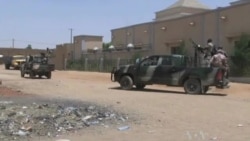GAO, MALI —
France has pulled its first 100 soldiers out of Mali, part of a gradual drawdown to bring their 4,000 troops there down to just 1,000 by the end of the year.
Three months ago, France intervened in northern Mali ago to halt an Islamist advance south and reclaim territory occupied by the al-Qaida-linked militants since last April.
The French now plan to hand over security for much of the vast, 800,000 kilometer region to an eventual United Nations stabilization mission of African troops that could number more than 11,000.
French military patrols roll through Gao's neighborhoods like clockwork. It is textbook counterinsurgency. Residents say it is reassuring. But they are leaving.
The French have done most of the heavy lifting in this war. Only time will tell whether those air strikes and desert sweeps have rooted out most of the insurgents or simply sent them underground to bide their time until the big guns leave.
The Malian army has struggled to fend off the small groups of jihadists who have been sneaking back into Gao to mount attacks since the city's liberation on January 26.
Gao residents, like Imam Hama Maiga, say they are not sure the Malian army can keep them safe.
"We need to be able to trust our men, the Malian army. We need to cooperate with them…. And, whatever training it is that the French have, we want our army to have the same so that they can take over the security of this country," said Maiga.
In Gao, the Malian army is still working to win the trust of the local community, and vice versa.
At a neighborhood gathering, the mother of one of three young men beaten by Malian soldiers at a checkpoint brought up the incident to Lt. Col. Nema Sagara, army second-in-command in the north.
"The three youth ran after the military had called on them to stop. When someone flees, the soldiers think it is an enemy," Sagara explained. "The soldiers at these posts had been fired upon the night before and that is why they beat up the youth. But it could have been worse, they could have fired on them. Tell your children. When, we tell you to stop, stop."
France is gradually turning over security in parts of the Gao region to West African regional troops from Niger and Senegal. Analysts say these regional soldiers are not much better equipped or better trained for this type of asymmetrical warfare than their Malian counterparts.
Gao's residents say all they can do is wait and see.
Three months ago, France intervened in northern Mali ago to halt an Islamist advance south and reclaim territory occupied by the al-Qaida-linked militants since last April.
The French now plan to hand over security for much of the vast, 800,000 kilometer region to an eventual United Nations stabilization mission of African troops that could number more than 11,000.
French military patrols roll through Gao's neighborhoods like clockwork. It is textbook counterinsurgency. Residents say it is reassuring. But they are leaving.
The French have done most of the heavy lifting in this war. Only time will tell whether those air strikes and desert sweeps have rooted out most of the insurgents or simply sent them underground to bide their time until the big guns leave.
The Malian army has struggled to fend off the small groups of jihadists who have been sneaking back into Gao to mount attacks since the city's liberation on January 26.
Gao residents, like Imam Hama Maiga, say they are not sure the Malian army can keep them safe.
"We need to be able to trust our men, the Malian army. We need to cooperate with them…. And, whatever training it is that the French have, we want our army to have the same so that they can take over the security of this country," said Maiga.
In Gao, the Malian army is still working to win the trust of the local community, and vice versa.
At a neighborhood gathering, the mother of one of three young men beaten by Malian soldiers at a checkpoint brought up the incident to Lt. Col. Nema Sagara, army second-in-command in the north.
"The three youth ran after the military had called on them to stop. When someone flees, the soldiers think it is an enemy," Sagara explained. "The soldiers at these posts had been fired upon the night before and that is why they beat up the youth. But it could have been worse, they could have fired on them. Tell your children. When, we tell you to stop, stop."
France is gradually turning over security in parts of the Gao region to West African regional troops from Niger and Senegal. Analysts say these regional soldiers are not much better equipped or better trained for this type of asymmetrical warfare than their Malian counterparts.
Gao's residents say all they can do is wait and see.





